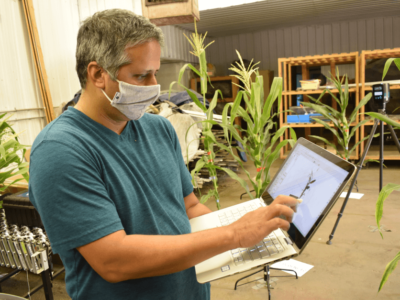| Title XI: Crop Insurance | |||
Title VII Research
What it does: Authorizes the principal research, education, and extension authorities, addressing both extramural and intramural activities. USDA's National Institute of Food and Agriculture, for example, administers extramural programs by providing capacity funding to land-grant institutions. It also provides funding under competitive grant programs.
What it costs: $1.3 billion of the projected 10-year cost of farm bill programs through 2033.
What’s in play: Ag research supporters warn that funding in the U.S. has been falling for years — by one-third since 2002 — which has had the effect of ceding primacy in the space to international competitors, especially China, which is now the largest funder of research in the world.
Dozens of groups want to see $8 billion in mandatory funding in the title, which would be a switch from the standard practice of simply reauthorizing programs and funding them through annual appropriations. An exception is the Foundation for Food and Agriculture Research, which uses its direct farm bill funding ($185 million in the 2018 farm bill) to leverage private funds.

Land-grant universities have been especially vocal about getting money to fix aging research facilities that have become obstacles both to scientific advancement and to the ability of institutions to attract students.
The Specialty Crop Farm Bill Alliance is seeking funding for a number of priorities, including $20 million annually for automation research and $50 million annually for the IR-4 Project, which is aimed at developing alternative pest management solutions.
Notable marker bills:
S.98 - The Agriculture Innovation Act of 2023, led by Sen. Amy Klobuchar, D-Minn., would require USDA to analyze the producer data it collects to assess the impact of farming practices on crop yields, soil health and farm profitability.
H.R.4135 – The AuGmenting Research and Educational Sites to Ensure Agriculture Remains Cutting-edge and Helpful Act, or the AG RESEARCH Act, led by Rep. Kim Schrier, D-Wash., would require $1 billion in mandatory spending and authorize another $1 billion in appropriations over five years for infrastructure grants to agricultural research facilities.
H.R.2720 — The Strengthening Organic Agricultural Research (SOAR) Act of 2023, led by Rep. Dan Newhouse, R-Wash., would increase funding for the Organic Agriculture Research and Extension Initiative (OREI) through the life of the farm bill.
S.834 and H.R. 2385 — The ACE Agriculture Act, led by Sen. Michael Bennet, D-Colo., and Rep. Jimmy Panetta, D-Calif., would elevate the role of the Agricultural Advanced Research Projects Agency, which is authorized by Congress but yet to be created by USDA. The bill would double the authorized funding level to $100 million annually.



![Steve headshot 250x200[1]](http://www.agri-pulse.com/ext/resources/Headshots/Staff-Photos/thumb/Steve_Headshot_250x200[1].JPG?1738947158)


